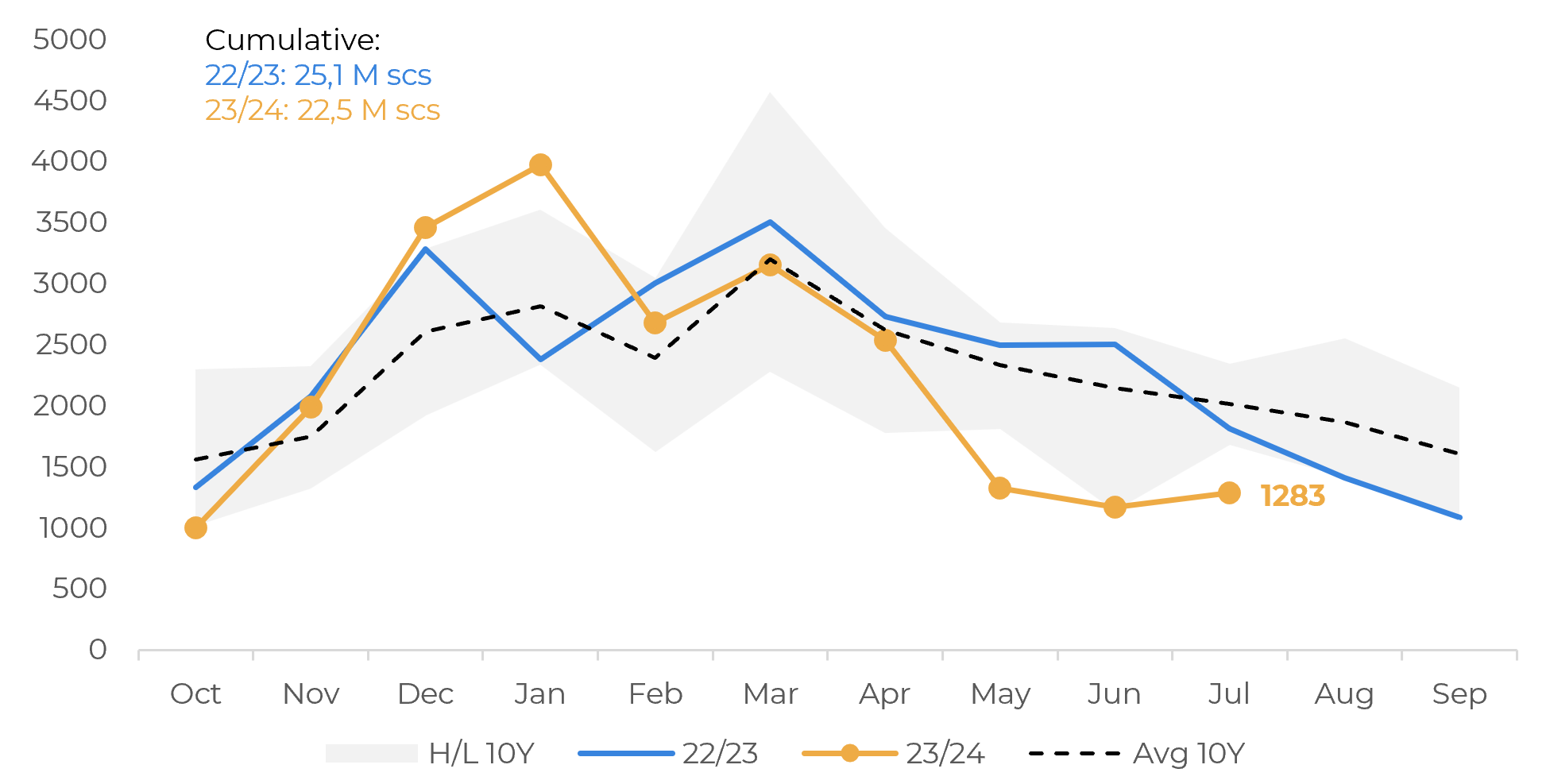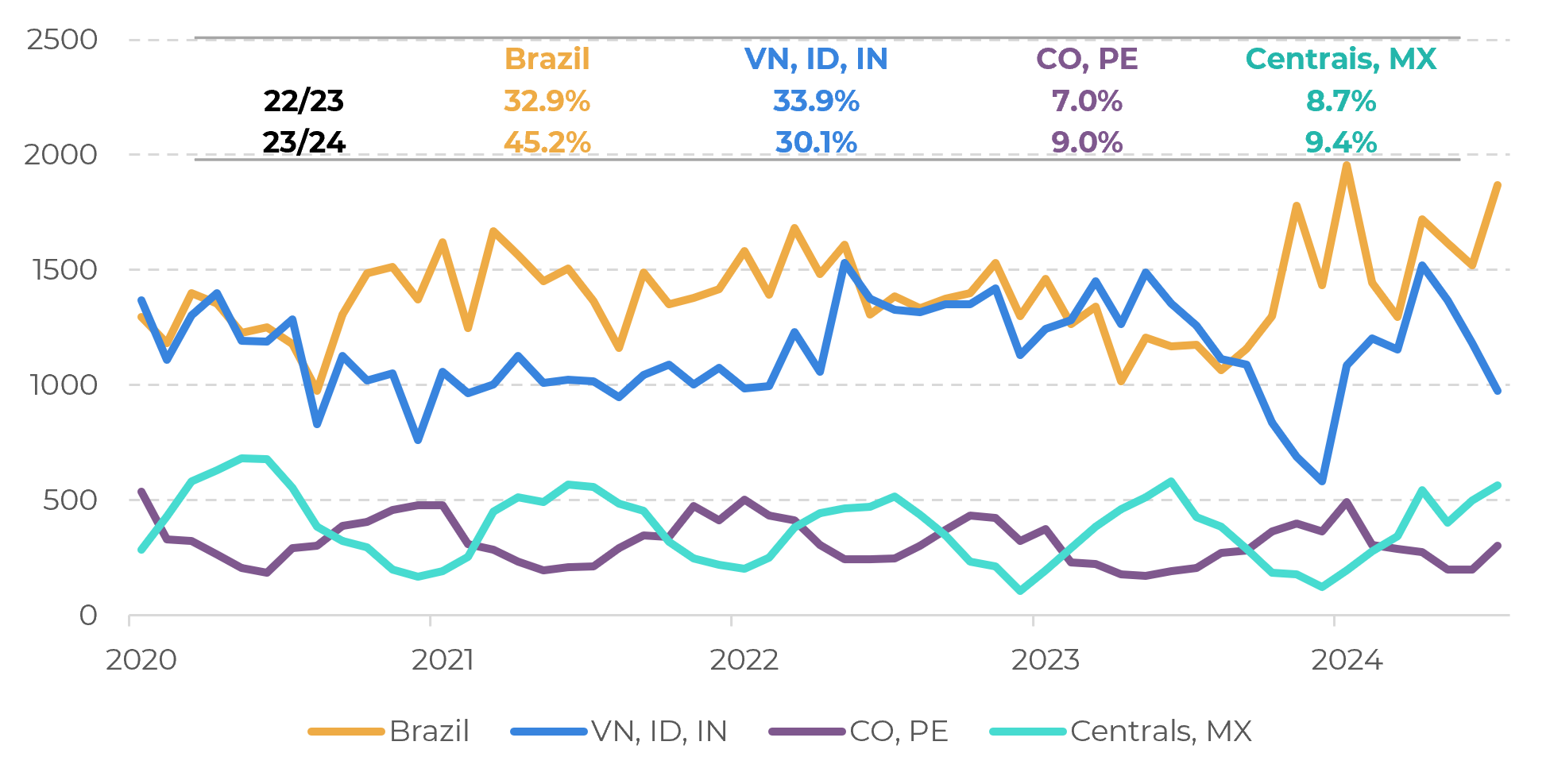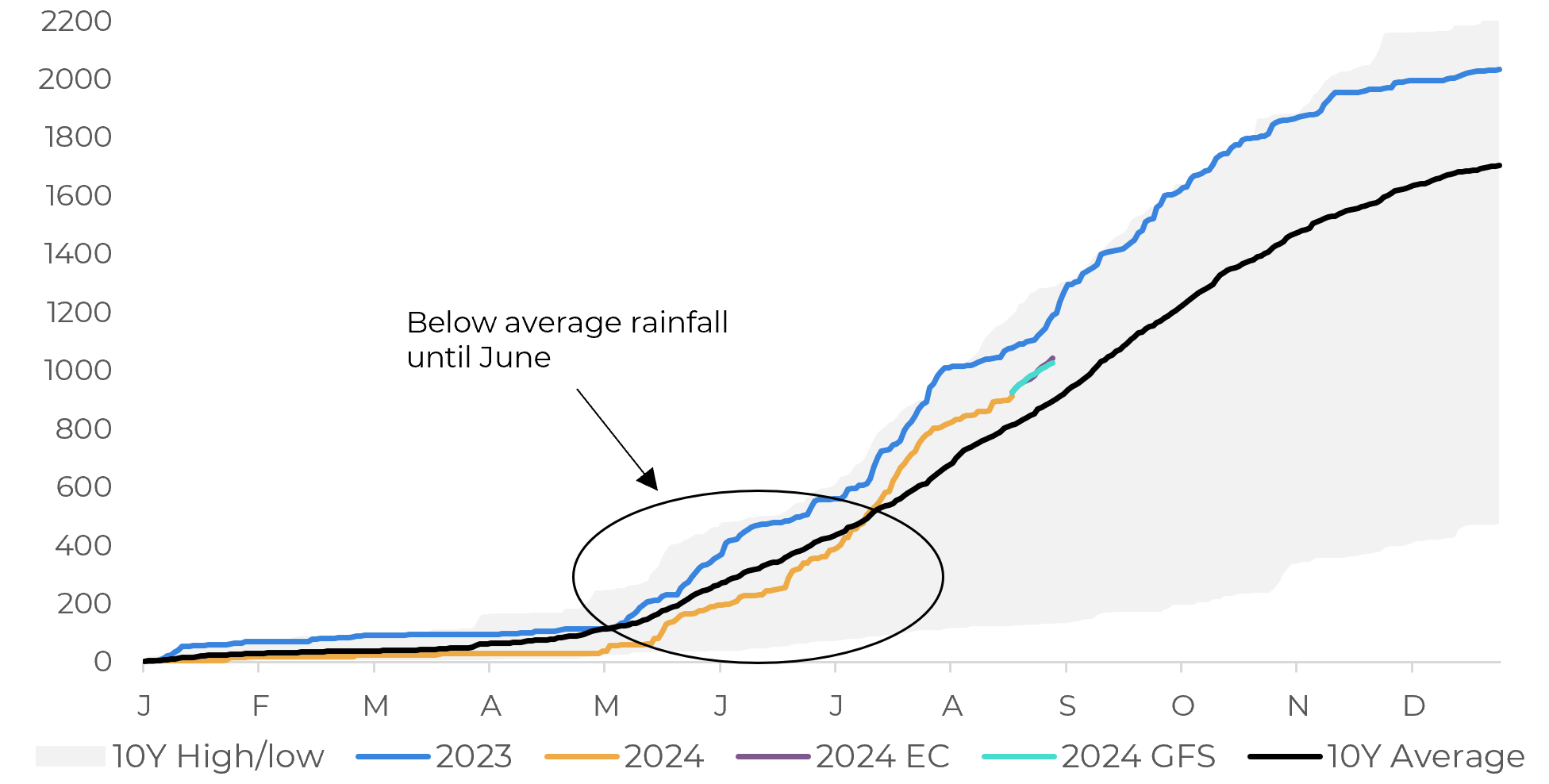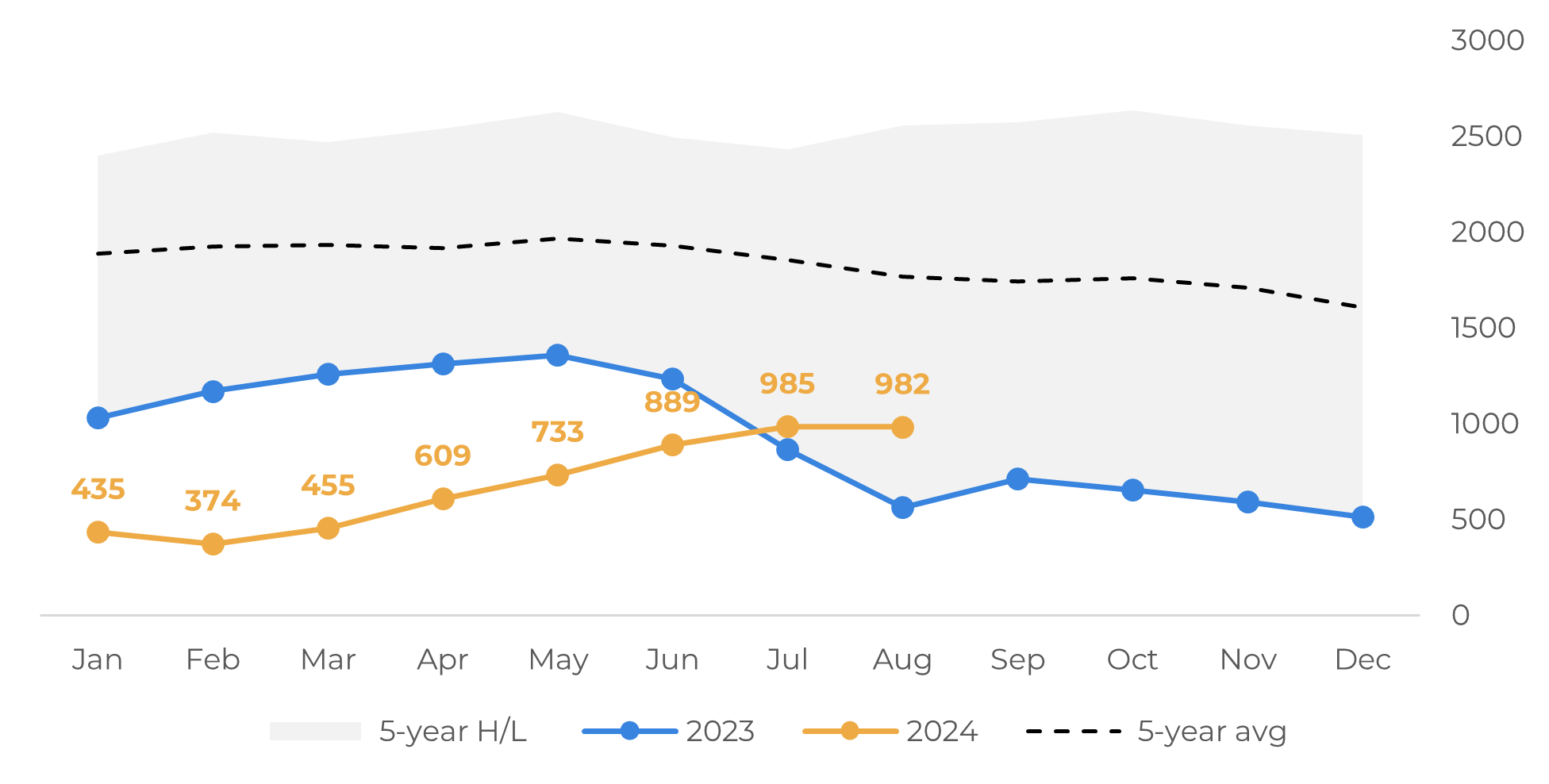
Aug 23
/
Laleska Moda
Vietnamese exports remain below average, supporting the market
Back to main blog page
- The coffee market remains bullish. For robusta in particular, Vietnamese exports are still below-average (and even below historically lows) in recent months, reinforcing the perception of low stocks in the country, with accumulated shipments in 23/24 10.2% lower than the same period in 22/23.
- In addition to Vietnam, Indonesia shipments are also below historic lows, although a rebound is expected in 24/25.
- On the other hand, more favorable weather conditions in Vietnam could lead to a recovery in production in 24/25. However, our expectations are still for a lower production next season.
- Another potential bearish point for the market is the increase in the certified Robusta stocks on the ICE, in the last two months
- On the other hand, weather uncertainties in Brazil could still support prices - both for Robusta and Arabica - in the coming weeks.
Vietnamese exports remain below average, supporting the market
Robusta coffee prices rose for much of this week, reflecting concerns about the supply of the variety. Since 2023, prices have risen due to the decline in production in Vietnam and Indonesia in the 23/24 season, and also due to climatic concerns in the development of the 24/25 crop in the former country.
The region's supply tightening justifies the recent Asian export trend.. In the case of Vietnam, coffee shipments have been below historical averages since April, and in some months even below historical lows, reinforcing the view of low stocks in Southeast Asia. Accumulated shipments in the 23/24 season (22.5 M bags) are already 10.2% lower than in the 22/23 season (25.1 M bags).
In Indonesia, shipments also reached low levels in 23/24, besides in the first months of 24/25 (which began in April/24). However, exports are expected to increase by the end of the year due to the expected recovery in production in this new cycle.
It's worth noting that this scenario of limited supply in Southeast Asia has also led to some changes in destinations. For example, in the European Union (the world's largest coffee importer), the share of Vietnamese, Indonesian, and Indian coffee in the bloc's imports fell in 23/24 (Oct/23-Jul/24), with a significant drop in July, in line with Vietnam's low exports. On the other hand, we see a significant increase in imports of Brazilian grains - as shown in a previous report.
Vietnam – Exports (‘000 bags)

Source: Refinitiv
European Union - Imports by country/region ('000 bags)

Source: Europena Comission, Eurostat
Despite the more bullish scenario, it's worth noting that we also have some potential downside in the market. Firstly, the more favorable weather in Vietnam in recent months - especially in July - has raised some agents' expectations of a slight recovery in the country's production in 24/25. However, we still expect a smaller crop this season due to higher average temperatures and below average cumulative rainfall until June.
Another noteworthy development is the rebound in ICE-certified coffee stocks. Although stocks are still below historical averages, July and August saw a greater inflow of coffee, exceeding the 2023 average for these months. Expectations of higher exports from Brazil and Indonesia - especially to Europe, given concerns about the EUDR - and a possible short-term recovery in stocks could exert downward pressure.
Cumulative Precipitation – Vietnam – Central Highlands (mm)

Source: Refinitv
Estoques Certificados de Robusta (‘000 sacas)

Source: ICE
However, it is important to remember that expectations for the remaining 24/25 crop still point to a coffee defict, especially given the lower production of robusta. In addition, the weather outlook in the origins will also influence coffee prices in the coming months, for both Arabica and Robusta.
In this case, the market's biggest uncertainties revolve around Brazil. Lower temperatures in early August have pushed LN and NY futures higher. A new cold front is also on its way to the coffee producing regions in the coming days, keeping the market on its toes. In addition, there are growing concerns about the dry weather in the country as some flowering has been seen in the producing regions.
Dryness in the coming weeks, especially in September, could have an impact on the 25/26 harvest, adding to the rally. On the other hand, abundant rainfall in the upcoming months would bring a more optimistic outlook for the following season. In this case, with the intensity of the La Niña phenomenon decreasing in the last month, the weather is expected to remain closer to normal in the second half of the year.
In Summary
Weather uncertainties have brought volatility to the arabica and robusta coffee markets in recent days. The passage of a cold front through Brazil over the weekend led to frost in some coffee growing regions, pushing up commodity prices. However, initial reports indicate that the impact was much lower than in 2021, as the frosts occurred mainly in lowland areas and the condition of the crop - as measured by the NDVI index - is better than this year.
On the other hand, better estimates of 25/26 production potential could be made in the coming weeks as the next season's flowering is expected to begin.
On the bearish side, Brazilian export data for July showed increased shipments, particularly of conilon/robusta coffee, which reached historic highs. The continued strong performance of Brazilian exports could put some downward pressure on the market in the short term, just as Indonesian exports did in July.
However, it's important to remember that the fundamentals still point to price support in the medium term. Even with a possible decline in some destinations, demand remains generally resilient, and the outlook continues to be for a global deficit in 24/25 with stocks (both origins and destinations) at lower levels.
Weekly Report — Coffee
Written by Laleska Moda
laleska.moda@hedgepointglobal.com
Reviewed by Livea Coda
livea.coda@hedgepointglobal.com
livea.coda@hedgepointglobal.com
www.hedgepointglobal.com
Disclaimer
This document has been prepared by Hedgepoint Global Markets LLC and its affiliates (“HPGM”) solely for informational and instructional purposes, without the purpose of instituting obligations or commitments to third parties, nor is it intended to promote an offer, or solicitation of an offer of sale or purchase relating to any securities, commodities interests or investment products. Hedgepoint Commodities LLC (“HPC”), a wholly owned entity of HPGM, is an Introducing Broker and a registered member of the National Futures Association. The trading of commodities interests such as futures, options, and swaps involves substantial risk of loss and may not be suitable for all investors. Past performance is not necessarily indicative of future results. Customers should rely on their own independent judgement and outside advisors before entering in any transaction that are introduced by the firm. HPGM and its associates expressly disclaim any use of the information contained herein that directly or indirectly result in damages or damages of any kind. In case of questions not resolved by the first instance of customer contact (client.services@hedgepointglobal.com), please contact our internal ombudsman channel (ombudsman@hedgepointglobal.com) or 0800-878- 8408/ouvidoria@hedgepointglobal.com (only for customers in Brazil)
Contact us
hedgepointhub.support@hedgepointglobal.com
ouvidoria@hedgepointglobal.com
Funchal Street, 418, 18º floor - Vila Olímpia São Paulo, SP, Brasil
This page has been prepared by Hedgepoint Schweiz AG and its affiliates (“Hedgepoint”) solely for informational and instructional purposes, without the purpose of instituting obligations or commitments to third parties, nor is it intended to promote an offer, or solicitation of an offer of sale or purchase relating to any securities, commodities interests or investment products. Hedgepoint and its associates expressly disclaim any use of the information contained herein that directly or indirectly result in damages or damages of any kind. Information is obtained from sources which we believe to be reliable, but we do not warrant or guarantee the timeliness or accuracy of this information. The trading of commodities interests such as futures, options, and swaps involves substantial risk of loss and may not be suitable for all investors. You should carefully consider wither such trading is suitable for you in light of your financial condition. Past performance is not necessarily indicative of future results. Customers should rely on their own independent judgement and/or advisors before entering in any transaction.Hedgepoint does not provide legal, tax or accounting advice and you are responsible for seeking any such advice separately.Hedgepoint Schweiz AG is organized, incorporated, and existing under the laws of Switzerland, is filiated to ARIF, the Association Romande des Intermédiaires Financiers, which is a FINMA-authorized Self-Regulatory Organization. Hedgepoint Commodities LLC is organized, incorporated, and existing under the laws of the USA, and is authorized and regulated by the Commodity Futures Trading Commission (CFTC) and a member of the National Futures Association (NFA) to act as an Introducing Broker and Commodity Trading Advisor. HedgePoint Global Markets Limited is Regulated by the Dubai Financial Services Authority. The content is directed at Professional Clients and not Retail Clients. Hedgepoint Global Markets PTE. Ltd is organized, incorporated, and existing under the laws of Singapore, exempted from obtaining a financial services license as per the Second Schedule of the Securities and Futures (Licensing and Conduct of Business) Act, by the Monetary Authority of Singapore (MAS). Hedgepoint Global Markets DTVM Ltda. is authorized and regulated in Brazil by the Central Bank of Brazil (BCB) and the Brazilian Securities Commission (CVM). Hedgepoint Serviços Ltda. is organized, incorporated, and existing under the laws of Brazil. Hedgepoint Global Markets S.A. is organized, incorporated, and existing under the laws of Uruguay. In case of questions not resolved by the first instance of customer contact (client.services@Hedgepointglobal.com), please contact internal ombudsman channel (ombudsman@hedgepointglobal.com – global or ouvidoria@hedgepointglobal.com – Brazil only) or call 0800-8788408 (Brazil only).Integrity, ethics, and transparency are values that guide our culture. To further strengthen our practices, Hedgepoint has a whistleblower channel for employees and third-parties by e-mail ethicline@hedgepointglobal.com or forms Ethic Line – Hedgepoint Global Markets.Security note: All contacts with customers and partners are conducted exclusively through our domain @hedgepointglobal.com. Do not accept any information, bills, statements or requests from different domains and pay special attention to any variations in letters or spelling, as they may indicate a fraudulent situation.“HedgePoint” and the “HedgePoint” logo are marks for the exclusive use of HedgePoint and/or its affiliates. Use or reproduction is prohibited, unless expressly authorized by HedgePoint. Furthermore, the use of any other marks in this document has been authorized for identification purposes only. It does not, therefore, imply any rights of HedgePoint in these marks or imply endorsement, association or seal by the owners of these marks with HedgePoint or its affiliates.

